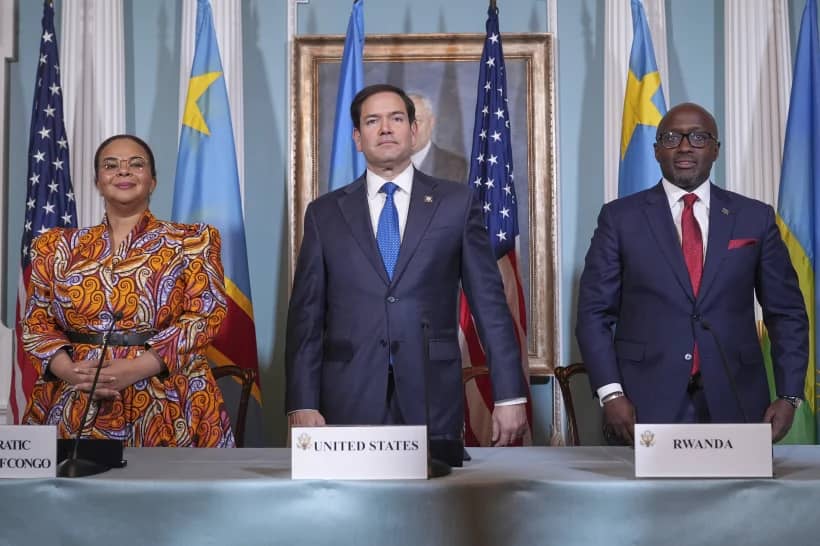YAOUNDÉ, Cameroon – Although genetically modified food is commonplace in the United States, it is still controversial in places such as the European Union, which possibly has the most stringent regulations on the products in the world.
This debate over GM food is now taking place in Africa, and the Catholic Church is taking part – although Church leaders are disagreeing on which path to take.
In Ghana, the issue is at the forefront, since field trials on its first GM crop – the Bt cowpea, which is resistant to the pod-borer pest – have recently been completed.
“GMOs can help us deal with agricultural challenges, including the problems with food insufficiency,” said Gaston Kofi Hunkpe, a catechist with the Catholic Church who holds a degree in clinical biochemistry.
“So it’s a good thing we should adopt and implement and it will go a long way to help us … Countries using it testify that it is a good technology and so it should go across the whole world,” he said.
However, Samuel Zan Akologo, the head of Caritas Ghana, told Crux he doesn’t see GMOs as offering solutions to Ghana’s and Africa’s food problems, linking the technology to entrenched financial interests of those promoting it.
“GMO has masked interest based on control of seed for profit. Besides, Ghana’s food problems (if any) are due to factors either due to reliability or quality of seed! One needs to see awful waste and loss of food stuffs in Ghana during harvest. Efficient storage and distribution of farmers’ harvest is more critical than trying to control what they plant and eat through genetically modified seed,” he said.
He was referring to the fact that biotech companies own the patent on their seeds, and strictly regulate their distribution and preventing farmers from saving seeds from their harvest, which is a common objection raised against GM food.
Akologo said what Ghanaians eat “is part of our very identity and cultural expression. This is at the core of the principle of food sovereignty.”
However, the Caritas head dismissed the objection of some anti-GM activists that the process was “mocking God,” calling the debate misplaced.
“The criticisms against GMOs, in my view are not doctrinal,” he said.
“Technology and innovation in agricultural systems and practice are welcome so long as they do not infringe on people’s right to food based on the principle of food sovereignty. Farmers must have the liberty to grow what they eat and eat what they grow,” Akologo said.
In 2013, the president of the Ghana Conference of Catholic Bishops, Bishop Joseph Osei-Bonsu, said: “We believe that Ghana can achieve food sufficiency and even produce surplus food for export using the conventional means of farming.”
Akologo told Crux the position of the bishops has not changed.
“The Catholic Bishops’ Conference did not support the attempt by Government of Ghana to introduce GMOs by legislation through Parliament a few years ago. So, Bishop Osei-Bonsu may have spoken generally about the opinion of leaders of other churches. The position of the Catholic Bishops’ Conference has not changed,” he said.
He said the introduction of GM food could deal a fatal blow to the Decade of Family Farming recently launched by the UN’s Food and Agriculture Organization (FAO) and International Federation of Agricultural Journalists (IFAJ) to run from 2019 to 2028.
“This will suffer fatal defeat if the subtle commercial interest of GMOs are not exposed and put in check,” he told Crux.
But Hunkpe insists that it is necessary for Africa to be open to technological change.
“Scientific advancement is a God-given gift that we human beings must explore. And while exploring it, we tend to discover things that will help us as humans. So I don’t see it as in conflict at all with God,” he said.
The catechist said he regretted the bishops were somehow skeptical about the technology.
“This has come up at our Catholic bishops’ conference and their stance against the technology is a blow to our fight to improve food sufficiency. But I think with education they will come to accept the fact that GMO is not in conflict with God’s plans for the earth … It is rather God who has given us this type of technique to use,” he said.
Hunkpe said it was necessary for Catholics to welcome the technology, the same way they back the idea of using technology for the good of mankind.
“The Catholic Church as an institution, for instance, has so many hospitals across the world. Is it not the same technology they are employing? Biotechnology is being employed in terms of vaccinations. In fact, they are encouraging people to take vaccinations. They are all aspects of the application of biotech that we have. So why don’t we employ the same technology across agricultural lines? It doesn’t conflict with the beliefs of God in any way,” he said.
Crux is dedicated to smart, wired and independent reporting on the Vatican and worldwide Catholic Church. That kind of reporting doesn’t come cheap, and we need your support. You can help Crux by giving a small amount monthly, or with a onetime gift. Please remember, Crux is a for-profit organization, so contributions are not tax-deductible.

















